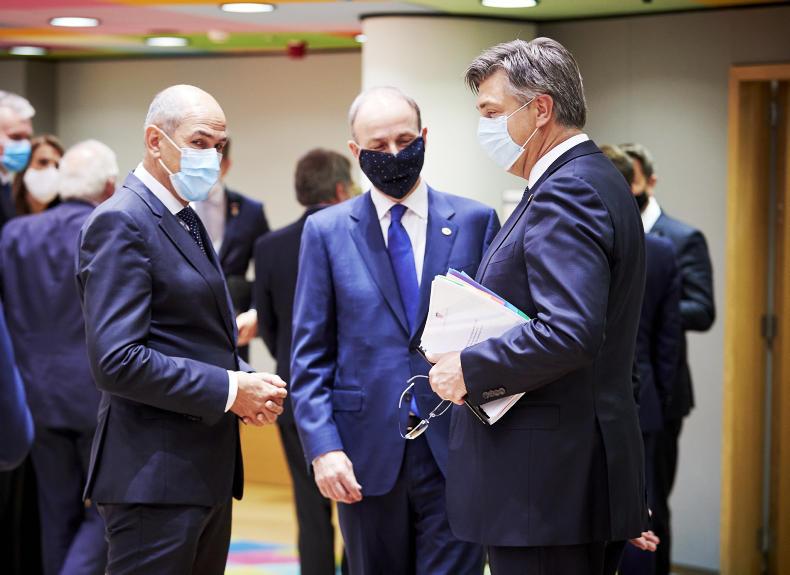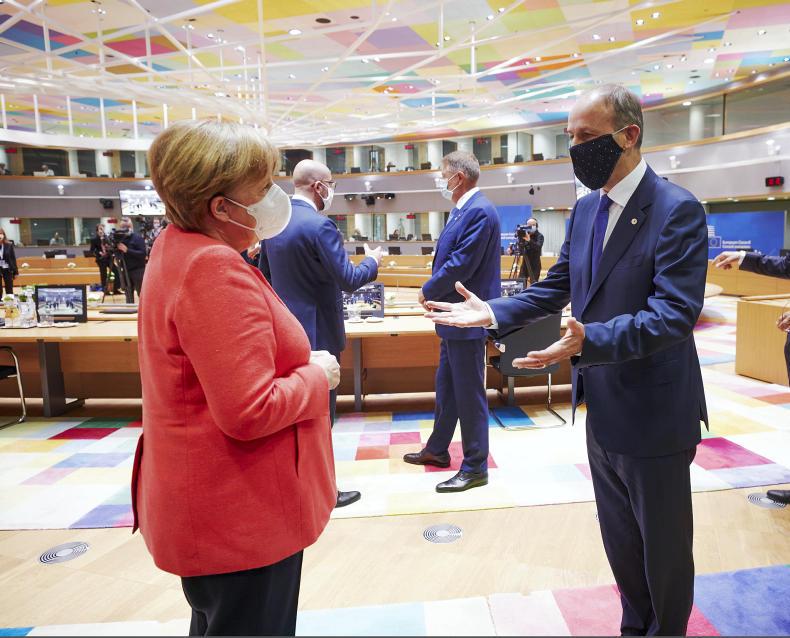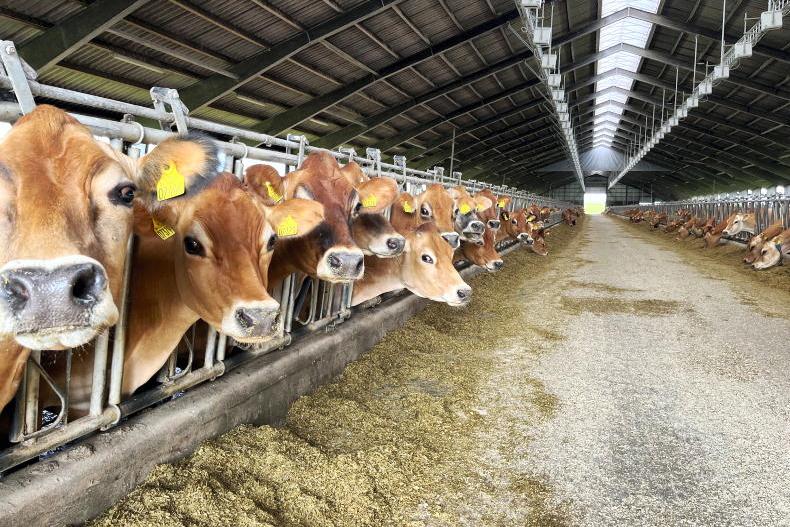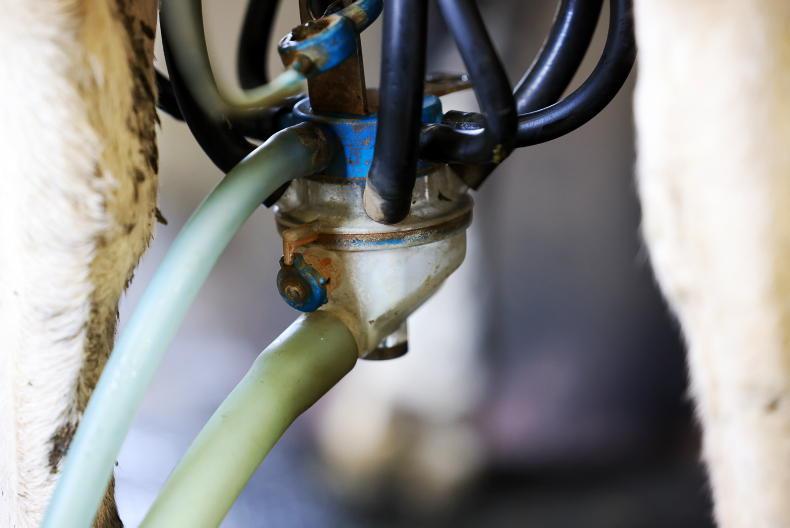The EU Council of Ministers, which is made up by the heads of state from the EU27, meets under the German presidency on Friday.
It is Micheál Martin’s first council meeting as Taoiseach and he is under pressure to deliver a budget that is no worse than the one recently proposed by the European Commission, which would give agriculture €391.5bn over the next seven years in CAP funding.
Why is today’s Council of Ministers meeting so important?
Its main business is to try to get agreement between members on the €750bn EU COVID-19 recovery fund and agree a budget for the next seven years, known as the multiannual financial framework (MFF) under which the CAP is funded.
What is different in this meeting for farmers?
After several failed attempts to get agreement on an EU budget or MFF for the next seven years, most recently in February, there is a belief that the leaders will keep talking this weekend until they reach agreement.
How will this affect Irish farmers?
The overall amount of money available for the CAP which provides the payments to farmers is decided as part of the MFF. Agreeing the MFF is necessary to finalise the CAP, which also runs for seven years, the same as the budget.
The Commissioner said in the Irish Farmers Journal this week that there would be €700m more for Irish farmers so what is there to discuss?
What the Commissioner said was that the budget proposals made by the Commission recently were bigger than the previous proposal made by the Commission in June 2018.

Taoiseach Michael Martin at Friday's EU Council meeting in Brussels.
However, the Commission makes proposals and it is the Council or heads of government that decide. In his interview with the Irish Farmers Journal, the Agriculture Commissioner did add 'subject to approval'.
What are the potential roadblocks in the way of an agreement?
The relaxation of state aid rules during the COVID-19 crisis saw EU’s wealthier nations give huge rescue packages to their economies that couldn’t be matched by the less-well-off countries.
This undermines the very principle of the single market, where all 27 countries are supposed to be equal and have the same rules on state support.
The rescue package, supported by France and Germany, is an attempt to level the playing field between countries, supported by a larger MFF than was previously proposed.
Who is for, who is against, and where does Ireland stand?
Germany and France, being the two largest economies, want to maintain the single market intact so that they can keep selling stuff to other countries. That makes them prepared to spend money to maintain the single market.
Austria, Netherlands, Sweden and Denmark - known as the Frugal Four - don’t want to contribute more money because they don’t believe the southern European countries have the budgetary discipline that is needed to manage finances.
Ireland, instinctively, leans towards the frugal group, but needs the money, so is supportive of the fund, putting it in the centre ground.
What works best for Irish farmers?
The best outcome for Irish farmers is that the MFF proposed by the Commission is approved, along with the recovery fund.
What are the chances of that happening?
Some concessions will be made to keep the frugal four on board. However, when France and Germany combine, they are a powerful force, especially as there is no UK, which would have been with the frugal four had they still been a member.
When will we know?
Expect all-night talks on Friday running into Saturday. If it is going well, it could extend into Sunday, at which point we would be expecting a result.
The Irish Farmers Journal will be monitoring the Council proceedings and will bring a full report on the outcome and what it means for farmers when talks conclude.
Read more
The big interview with Janusz Wojciechowski: ‘Farmers are part of the solution’
‘CAP must be top priority at EU council meeting’ - IFA
Department eyes up wiggle room in ‘genuine farmer’ definition
The EU Council of Ministers, which is made up by the heads of state from the EU27, meets under the German presidency on Friday.
It is Micheál Martin’s first council meeting as Taoiseach and he is under pressure to deliver a budget that is no worse than the one recently proposed by the European Commission, which would give agriculture €391.5bn over the next seven years in CAP funding.
Why is today’s Council of Ministers meeting so important?
Its main business is to try to get agreement between members on the €750bn EU COVID-19 recovery fund and agree a budget for the next seven years, known as the multiannual financial framework (MFF) under which the CAP is funded.
What is different in this meeting for farmers?
After several failed attempts to get agreement on an EU budget or MFF for the next seven years, most recently in February, there is a belief that the leaders will keep talking this weekend until they reach agreement.
How will this affect Irish farmers?
The overall amount of money available for the CAP which provides the payments to farmers is decided as part of the MFF. Agreeing the MFF is necessary to finalise the CAP, which also runs for seven years, the same as the budget.
The Commissioner said in the Irish Farmers Journal this week that there would be €700m more for Irish farmers so what is there to discuss?
What the Commissioner said was that the budget proposals made by the Commission recently were bigger than the previous proposal made by the Commission in June 2018.

Taoiseach Michael Martin at Friday's EU Council meeting in Brussels.
However, the Commission makes proposals and it is the Council or heads of government that decide. In his interview with the Irish Farmers Journal, the Agriculture Commissioner did add 'subject to approval'.
What are the potential roadblocks in the way of an agreement?
The relaxation of state aid rules during the COVID-19 crisis saw EU’s wealthier nations give huge rescue packages to their economies that couldn’t be matched by the less-well-off countries.
This undermines the very principle of the single market, where all 27 countries are supposed to be equal and have the same rules on state support.
The rescue package, supported by France and Germany, is an attempt to level the playing field between countries, supported by a larger MFF than was previously proposed.
Who is for, who is against, and where does Ireland stand?
Germany and France, being the two largest economies, want to maintain the single market intact so that they can keep selling stuff to other countries. That makes them prepared to spend money to maintain the single market.
Austria, Netherlands, Sweden and Denmark - known as the Frugal Four - don’t want to contribute more money because they don’t believe the southern European countries have the budgetary discipline that is needed to manage finances.
Ireland, instinctively, leans towards the frugal group, but needs the money, so is supportive of the fund, putting it in the centre ground.
What works best for Irish farmers?
The best outcome for Irish farmers is that the MFF proposed by the Commission is approved, along with the recovery fund.
What are the chances of that happening?
Some concessions will be made to keep the frugal four on board. However, when France and Germany combine, they are a powerful force, especially as there is no UK, which would have been with the frugal four had they still been a member.
When will we know?
Expect all-night talks on Friday running into Saturday. If it is going well, it could extend into Sunday, at which point we would be expecting a result.
The Irish Farmers Journal will be monitoring the Council proceedings and will bring a full report on the outcome and what it means for farmers when talks conclude.
Read more
The big interview with Janusz Wojciechowski: ‘Farmers are part of the solution’
‘CAP must be top priority at EU council meeting’ - IFA
Department eyes up wiggle room in ‘genuine farmer’ definition










SHARING OPTIONS